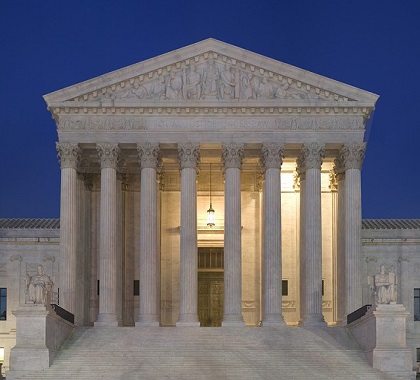The U.S. Supreme Court is reconsidering a longstanding decision preventing states from requiring out-of-state businesses to collect and remit sales taxes on purchases made by residents of their states.
Oral arguments in South Dakota v. Wayfair, Inc. began on April 17.
In the 1992 case Quill v. North Dakota, the Court established the “nexus” standard for business taxation, declaring a business need not remit sales taxes unless it maintains a physical location, or nexus, in the taxing jurisdiction. Consumers are supposed to pay the tax directly to governments, but compliance is rare.
Lawyers representing 41 states, including South Dakota, are asking the court to overturn the Quill decision.
Matter of Jurisdiction
Tim Huelskamp, president and CEO of The Heartland Institute, which publishes Budget & Tax News, says state governments lack the constitutional authority to tax people outside their borders.
“The United States is essentially 50 free markets,” Huelskamp said. “The Quill decision made it clear that, [for example] New York has no authority to tax folks in Kansas if the business doesn’t have a presence there, which matches all kinds of constitutional standards. We’re going to let the state of California reach into every state in the Union? It’s certainly scary to proponents of limited government.”
More Taxes, More Problems
Andrew Moylan, director of the National Taxpayer Union’s Interstate Commerce Initiative, says reversing the Quill decision would hit small business owners with more taxes and complex paperwork.
“Large retailers already have to collect tax in every state because they have storefronts, warehouses, or employees in states across the country,” Moylan said. “The people who would be negatively impacted by this are those small- and medium-sized businesses, and particularly people who utilize so-called marketplaces—think of websites like eBay or Etsy or even Amazon Marketplace.”
Huelskamp says states should reduce spending and enforce existing laws instead of trying to tax outsiders.
“I think we have a spending problem in most of these states, not a revenue problem,” Huelskamp said. “There are a number of other options. Eighty percent of this revenue is already collectible under current law.”
Interstate Commerce Slowdown
Moylan says undoing Quill would cause many business owners to stop selling to out-of-state consumers.
“They’d see huge compliance costs and major complexity to the point where they would most likely just not sell across state lines,” Moylan said. “If businesses find it too complicated to engage in interstate commerce, they will simply stop.”




